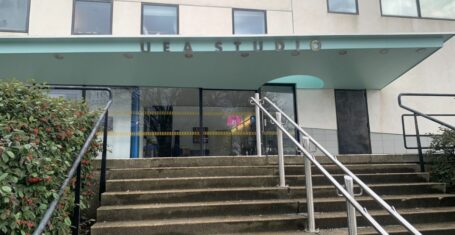
A Breath of Fresh Eyre at the Drama Studio
Part One of our review of the UEA Drama Studio’s epic production of Charlotte Brontë’s classic novel Jane Eyre.
It has been yet another thoroughly enjoyable night at the UEA Drama Studio, with students putting on a two part production of Charlotte Brontë’s famous novel Jane Eyre. It’s an incredible feat, managing to adapt an extensive novel, that spans many years in the life of its protagonists, and a wide variety of settings, but somehow its first half works, despite its long running time.
The plot concerns the life of Jane Eyre, at first a young girl, who grows up living with her aunty and her abusive children, before she is sent to a horrifying boarding school where she strikes up a friendship that changes her outlook on life and makes her reconsider her own behaviour. Of course, the majority of the story features a much older Jane Eyre, grown up, and working as a governess at Thornfield, a manor owned by the mysterious Mr Rochester, who Jane begins to fall in love with.
This is an adaptation that bravely takes its time to interpret all of the elements of the story equally, and does not allow the love story to overwhelm Jane’s early character development. Many of the film adaptations (and there have been many!) skip quickly over many of the earlier parts of the story, making Jane’s development into an adult less powerful, as we do not feel her suffering as much as we should. This was a play that felt truly grandiose and, though it left many with a sore backside, the result was an ensemble of absorbing characters.
The cast is too large to go through in much detail, though all of the actors and actresses did a superb job of juggling many different roles, both minor and major. Dudley Brewis captured the rigidity and sombre nature of Mr Rochester splendidly, and maintained brilliant chemistry with Alice Spalding, who plays Adult Jane mesmerisingly in the latter parts of the play, finding the sincerity and naivety that lies at the heart of Jane’s character. One particularly moving part of the production was the transition between young Jane (played excellently by Rosa French) and adult Jane, especially after we had been given roughly two and a half hours to become attached to the character of young Jane. One of the problems with the production in the case of young Jane was trying to convey the fact that she was a child, while she recited prose written from the point of view of older Jane, something that was interestingly combated partially by giving some of the narration to the ghost of Mr Reed, Jane’s uncle, who does not speak in the original novel.
Impressively, the transition between young Jane and adult Jane didn’t jar the performance. Both actresses seemed to channel each other, and yet bring some unique to each of their performances, helped, of course, by the identical wardrobe. It always felt like we were watching adult Jane, and not a new actress, something that highlights the talent that exists within the drama studio. One complaint would probably be with the portrayal of Mr Brocklehurst, Jane’s headmaster. While it was certainly not a bad performance (was, in fact, portrayed very convincingly, with an amazingly deep and disturbing voice and posture), it felt at times like he was overly aggressive, almost ludicrously so when, in the novel, he felt a lot more threatening by simply being imposing.
Overall, the first half of this production has been an ambitious, faithful and effective retelling of Charlotte Brontë’s classic novel, and thus will not disappoint fans of the book, especially in this age of stage adaptations where long books inevitably get chopped up due to short running times, the Drama Studio’s gutsy Jane Eyre remains delightfully whole and entertainingly intact. A real adaptation! Bravo!









































